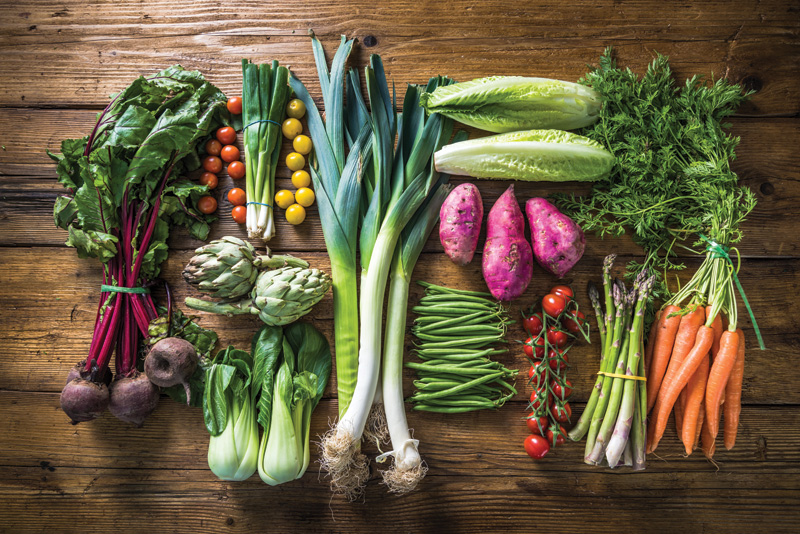Importance of Protein
Getting the right amount and the right kind of this important nutrient

Protein is needed for every function in the body, from growing new hair and nails to keeping teeth and bones strong to breathing and generating every precious heartbeat. For the average person, protein needs can vary from 50 to 180 grams per day.
Although most Americans easily meet their minimum daily protein requirements, the minimum amount may not be optimal – it will promote health and well-being but may leave you feeling hungry between meals. We’ve all experienced those hunger pangs that creep in midmorning, late afternoon and before we hit the sack at night, and once they set in, we grab the most convenient food around. These are the times we make poor choices and hit the vending machine, raid the fridge or rummage through the pantry. In the United States, diets lower in protein tend to be higher in calories, fat and sugar and lower in fiber.
With this in mind, we might be led to the other extreme and consume too much protein. One of the first places we may look for protein is in powders, energy drinks and supplements. These products can be costly, have impurities and make it easy to overdo. Consuming the high end of protein requirements may be needed for a serious athlete but for the average person, it can have negative consequences.
Excess protein can be taxing to the body, especially the kidneys, which need to work on overdrive to process and eliminate this excess.
With such a wide range of protein requirements, determining your ideal amount may seem like a daunting task, but the answer lies somewhere in the middle. About 100 to 115 grams is optimal for most active adults and those of us trying to shed a few pounds. Protein-packed meals will fill you up and keep you feeling full longer.
 Healthy sources of protein spaced out through the day can be a great way to improve your diet and help with weight control. Aim for a good source of protein at each meal, particularly at breakfast to power you through the day.
Healthy sources of protein spaced out through the day can be a great way to improve your diet and help with weight control. Aim for a good source of protein at each meal, particularly at breakfast to power you through the day.
BEST SOURCES FOR MEETING YOUR PROTEIN NEEDS
Obtaining protein from real, whole foods is best. Whole foods provide not only protein but other important nutrients your body needs. When most people think of protein-rich foods, what may come to mind is a thick juicy steak or burger.
Remember, though, animal sources of protein come with unhealthy fat and calories. In a recent large prospective study published in JAMA Internal Medicine, a journal of the American Medical Association, diets high in animal protein were associated with a high mortality from cardiovascular disease. Additionally, when plant proteins were consumed, even in high amounts, mortality from all causes was lower.
So, if you want to add protein to your daily regimen, think plant-based sources. Plant-based proteins are also good sources of fiber, vitamins and minerals, and they are low in fat and calories. The combination of a high-protein and nutrient-rich meal will fill you up for hours and prevent you from raiding the cookie jar. Take this typical breakfast and see how making a few simple changes can boost the protein content to help you to start the day off right:
Calories Protein Fiber
Corn flakes 113 2 1
Whole milk 150 8 0
Toast/jelly 100 1 <1
Apple juice 100 0 0
TOTAL 463 11 1
Steel cut oatmeal 170 7 5
Unsweetened soy milk 80 7 0
Almonds 104 3.8 2.1
Blackberries 62 2 7.6
TOTAL 416 20 15
Plant-based proteins can be found in numerous foods. Start by switching to 100% whole grains. Compared with refined grains, whole grains retain their natural protein and fiber content. Take care to look for “100%” on food labels as this ensures the item is less processed. Some examples of 100% whole grains are whole wheat, rye, rice (brown, red, black or other varieties), oats, quinoa, amaranth, spelt, millet, farro and barley.
Next, tackle your fruits and vegetables. Stick with whole fruits rather than juice to keep to the beneficial fiber. Choose ample amounts of vegetables prepared steamed, roasted or raw to avoid added fat and calories. Instead of chips, snack on nuts and seeds, which are packed with fiber, essential minerals and healthy fats.
And include plenty of beans, peas and legumes in your diet. Hummus, made from chickpeas, makes a great snack when you’re on the go.
With just some simple changes, you can easily add the power of protein to your day and reap the many benefits.
Paula Inserra is a professor at John Tyler Community College, where she heads the health science program. She has 20 years’ experience as a registered dietitian, is board certified in sports nutrition and has worked in clinical, community, research and academic settings. She earned her Ph.D. in nutrition science and cancer biology from the University of Arizona and completed her dietetic internship at the Mount Sinai Medical Center. Inserra has written several scientific publications and presented at national and regional conferences.


